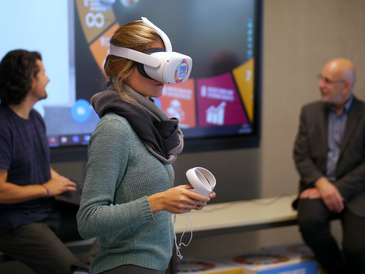In 2016, the 17 Sustainable Development Goals – SDGs of the United Nations came into force as part of the Agenda 2030. They are to serve the purpose of securing sustainable development on economic, social, and ecological levels. Based on this, the research project team developed SDG-Bot, a digital learning service which enables students to carry out joint research-based learning in the field of sustainability – and especially with regard to the SDGs. They are to be supported by the bot – a digital assistant – by means of conversation-based artificial intelligence (AI). The project stems from the field of sustainable management, which is led by Professor Georg Müller-Christ, in cooperation with the HumanRoboLab (HRL), which is led by Dr. Denis Pijetlovic from the Faculty of Business Studies & Economics.
“With the SDG-Bot, we are aiming for the development of a virtual creative space for teaching, which is suitable for learning and researching, and where practical solutions and news ideas on how to attain the UN’s 17 Sustainable Development Goals can be formed. We are convinced that investigative projects such as SDG-Bot are useful in transforming the economic system and moving it towards resource-oriented sustainability,” says Müller-Christ.
Corona as a Catalyst for Digital Joint Creativity
The relevance of the research project for teaching is especially clear when considering the current corona measures: “Due to the corona crisis, virtual classes and video chats have become normal for students. With the SDG-Bot, we want to take the next step and offer students an immersive learning experience where they can connect with each other and creatively work on sustainability together through research,” explains Pijetlovic.
Connecting Digitalization and Sustainability Creates Synergies
The SDG-Bot research project contributes to the sustainability strategy of the University of Bremen and, at the same time, is an extension of the digital learning and teaching on offer. Thus, in the frame of the research project, valuable synergies are created for the increased promotion of the focal topics of sustainability and digitalization.
The scientific assistants Lisa-Marie Seyfried, Frederike Bursee and Carry Luise Zimmermann, who are working on AI-based digital assistants and the effect of immersive, virtual experiences on learning processes, are accompanying the project. Their findings play a significant part in creating the virtual teaching and learning space.
Further Information:
HumanRoboLab: https://www.uni-bremen.de/nm/transfer/human-robo-lab (in German only)
Volkswagen AG funding: https://www.volkswagen-newsroom.com/de/pressemitteilungen/volkswagen-ag-spendet-nach-vereinbarung-mit-europaeischer-investitionsbank-10-mio-euro-fuer-europaeische-umweltprojekte-6743 (in German only)
Contact:
Dr. Denis Pijetlovic
Scientific Assistant
Faculty 07: Business Studies & Economics
Phone: +49 421 218-66782
Email: denis.pijetlovicprotect me ?!uni-bremenprotect me ?!.de

